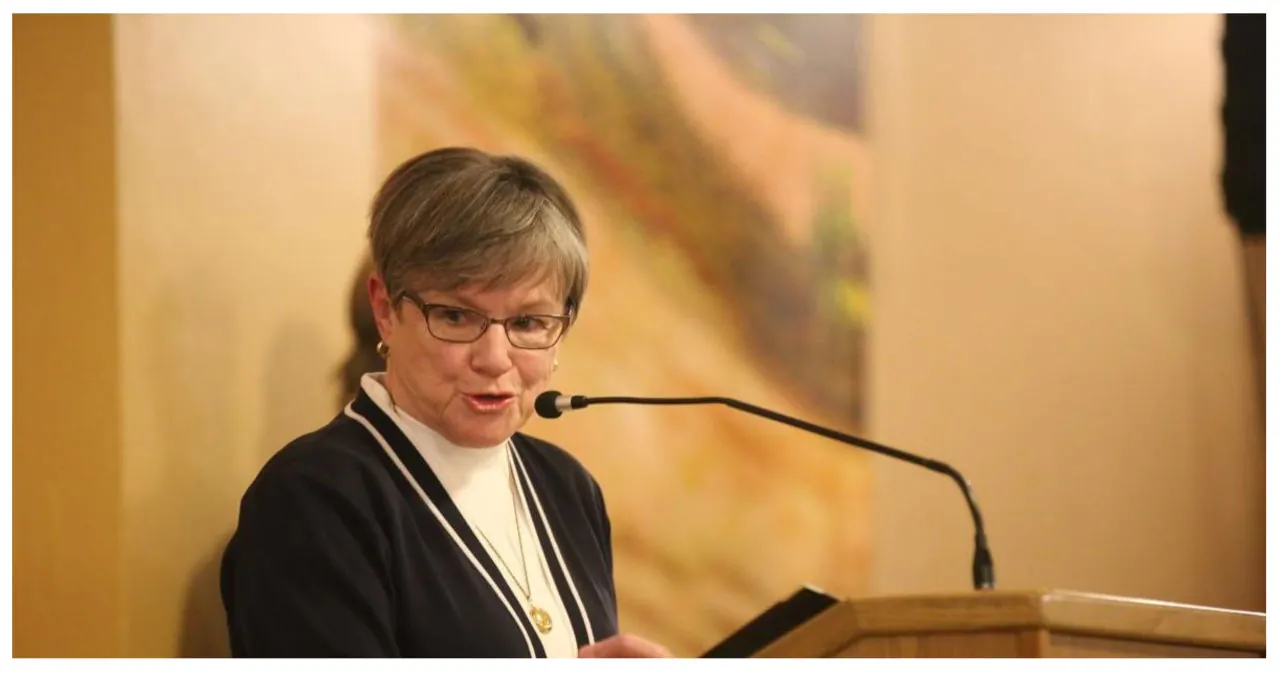Democratic Governor Laura Kelly has fulfilled her commitment by vetoing a tax cut plan proposed by Republicans that includes a flat tax.
“I am in favor of responsible tax cuts, but I will not approve a hasty implementation of a flat tax that would return us to the Brownback era while providing minimal benefits to the middle class,” Kelly stated on Friday. “This flat tax scheme would disproportionately advantage the ultra-wealthy, and I am not willing to jeopardize our public schools, infrastructure, and stable economy just to benefit the wealthiest individuals.”
Republicans have prioritized the implementation of a single-rate income tax, commonly referred to as a flat tax, during this session. However, Democrats oppose this approach as they believe it primarily benefits the wealthy.
Republican leadership combined a controversial item with several bipartisan proposals in House Bill 2284, labeling it as a compromise. This move was made despite removing Democrats from the conference committee. Additionally, they have claimed credit for each of the components, referring to them all as Republican ideas.
Lawmakers utilized a shell bill during the conference committee process, which allowed them to bypass the usual legislative procedures and expedite the creation of the HB 2284 package. Notably, this approach did not involve any public hearings or opportunities for public comment.
House Speaker Dan Hawkins, a Republican from Wichita, urged the governor to sign the compromise plan, emphasizing that it offers a middle ground solution.
However, Kelly had made a previous commitment to veto the bill, and she fulfilled that promise as soon as she could.
On January 17, the bill successfully cleared the House, followed by its passage in the Senate on January 18. However, instead of being immediately sent to the governor, Masterson and Hawkins decided to hold a ceremonial signing event before forwarding it to the governor. Typically, this procedural step is carried out without any grandeur.
On the final weekday allowed by the Kansas Constitution, the Legislature finally sent the bill to the governor. Governor Kelly, on the same day, promptly vetoed the bill.
Senate President Ty Masterson, R-Andover, issued a statement criticizing the governor for prioritizing her radical ideology over the needs of the people. He expressed disappointment in her decision to veto a compromise tax plan that aimed to boost the take-home pay of every Kansan and provide relief for hard-working taxpayers who are struggling due to the effects of Bidenflation. Masterson accused the governor of neglecting the middle ground and being too focused on hyper-partisan politics.
According to Hawkins, the Governor rejected proposals for property tax relief that would have automatically adjusted for inflation. Additionally, the Governor declined to support the elimination of income tax for 300,000 lower income Kansans, as well as the complete elimination of property tax for certain homeowners. Hawkins also mentioned that the Governor dismissed the idea of a simpler tax code and rejected proposals to eliminate the sales tax on food and social security.
What happens next?
Republicans will have 30 days to attempt to override the governor’s veto.
The bill will begin its journey in the House, where a supermajority of 84 out of 125 representatives is required. The House voted in favor of the bill with a majority of 81-37, despite the absence of four Republicans who had previously supported a different flat tax proposal.
In the Senate, the GOP faces a challenge, just like they did last year. To pass a bill, they need a supermajority of 27 out of 40 senators. The Senate approved the bill with a vote of 25-11, with one Republican absentee who had previously opposed a flat tax.
If the Republicans are unable to override the veto, it remains uncertain what the next course of action will be.
There is still ample time before the scheduled conclusion of the legislative session on April 30th, but Kelly has already expressed her intention to convene a special session.
Governor Kelly emphasized the need for the legislature to abandon the irresponsible flat tax experiment. She expressed her determination to ensure that taxes for middle-class families are reduced in a meaningful and responsible manner before the legislators leave Topeka this year. Governor Kelly even stated that she is willing to call a special session if necessary, just to ensure that Kansans receive immediate tax relief. She urged everyone to collaborate in finding a way to cut taxes that will sustain economic growth and benefit all Kansans, not just the wealthiest individuals.
After initially objecting to the introduction of Kelly’s tax cut proposal, the Senate tax committee has now scheduled a hearing for Senate Bill 377 on Wednesday.
How much would the tax cuts cost?
The current fiscal year has seen a projected surplus of $2.8 billion, with $1.7 billion safely stored in the rainy day fund, as reported by the state.
Over the next three fiscal years, the Republican tax cut plan will result in a total of $1.6 billion in tax cuts.
According to projections from the governor’s budget office, the state general fund is expected to face a deficit of approximately $515 million by fiscal year 2029.
According to an analysis from the Kansas Policy Institute, Republicans have attributed the increased spending, amounting to $1.6 billion, to the governor’s budget projections.
Adam Proffitt, the budget director, had previously informed lawmakers about the governor’s proposal. The proposal includes a 2.2% increase in the base budget. Additionally, $1.3 billion will be allocated for one-time expenses, specifically for paying off debt early or avoiding new debt.
Masterson believes that the governor has a different motive behind wanting to allocate that $1.3 billion.
“He said that the sole purpose is to drop the ending balance to make this tax cut look unsustainable.”

